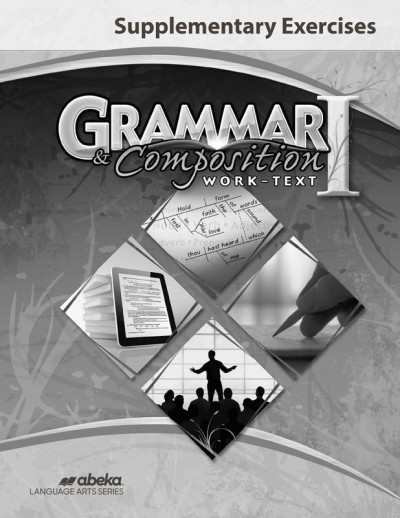We use cookies to make your experience better. To comply with the new e-Privacy directive, we need to ask for your consent to set the cookies. Learn more.
Grammar and Composition I Supplementary Exercises
These materials offer complete coverage of both writing and grammar.
Built on the belief that effective written communication glorifies God, this program builds effective oral and written communicators by laying a foundation in standard English grammar. In all levels, grammar, usage, and mechanics are practiced in abundant exercises, composition assignments, sentence diagramming, and memorization of certain grammatical components (such as the 49 prepositions, nominative and objective cases of pronouns, etc.). Systematic grammar review is routinely scheduled throughout the course and from level-to-level to build fluent writers.
At Grades 7-10, students develop clear and concise writing by progressing from sentence level development, to paragraph, to full compositions. In the first 2/3 of each course, writing assignments will, in some cases, play off short readings or the grammar review. At other times, specific assignments such as extended definitions, essays, and more are assigned. The composition sections at the end of each course typically overview the writing process, moving from focused writing assignments to broader assignments. You'll find writing assignments (a student sample included) spanning various genre (including poetry, letters, traditional essays, research papers, and more). Assignments serve as opportunities to introduce related, practical skills when applicable, such as using library skills or research paper documentation. Grade 9 adds a section to each unit: Improving Communication, highlighting such skills as concise writing, business writing, proofreading skills, effective listening, parallel structure, and effective listening. The smaller Grades 11-12 courses provide in-depth grammar review (engaging with extended passages) but exclude composition.
To create a complete English credit, these courses can be used with your choice of literature study by using the consumable student work-text (perforated pages that includes a condensed Grammar Handbook), the spiral bound teacher key (includes all answers and a detailed Grammar Handbook), quiz and test book with perforated pages, and the quiz/test book key. Alternatively, you can select the appropriate level of Abeka® English Homeschool Curriculum Plan, adding the prescribed components of literature as well as spelling/vocabulary/poetry.
An optional consumable worktext, Supplementary Exercises (with perforated pages) is available for students needing more grammar, usage, and mechanics' practice. Grammar skills are practiced by identifying, editing, and diagramming. Quarterly and year-end review are provided; a complete teacher key is available. While each chapter's focus aligns with the Abeka® Grammar and Composition work-texts, these supplements could be used for any student needing a grammar overview. ~ Ruth
Students start with a quick review of abbreviations and writing numbers, then focus on punctuation and sentence structure, before moving to grammar (parts of speech, and usage), with an emphasis on writing style. Throughout these chapters "Writer's Corner" assignments (with brief explanations, and detailed steps to plan, write, rewrite, and edit) will include letters, summaries, an informative essay, sketch, narrative, and process essay are assigned; each with one student sample. The composition section reviews the writing process, then guides students in creating outlines, book reports, paragraphs, and a final research project. Includes a grammar and diagramming handbook, documentation appendix, and index. 327 pgs, pb. The course requires the consumable student text and the spiral bound teacher key (full student text with answers and full Grammar Handbook). For testing, use the consumable student quiz and test booklet, and the teacher quiz and test key. Use the Supplementary Exercises (with perforated pages) for students needing more grammar, usage, and mechanics' practice. ~ Ruth
| Product Format: | Paperback |
|---|---|
| Brand: | A Beka Book |
| Grade: | 7 |
| Length in Inches: | 11 |
| Width in Inches: | 8.5 |
| Height in Inches: | 0.1875 |
| Weight in Pounds: | 0.3 |

